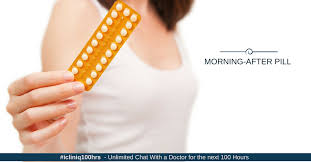In the event that contraceptive methods have failed (forgotten the pill, broken condom, unprotected sex) there is the so-called “morning after pill”. It is also known as emergency contraception and can prevent a high percentage of pregnancy if taken promptly. There are different ones Drugs each with a different active ingredient: either levonorgestrel (Pidana®) or ulipristal acetate (Ellaone®). Lets discuss about Morning-After Pill – Emergency Contraception.
The morning-after pill is available in pharmacies without a prescription. Since Germany has over ten thousand resident gynecologists and ensures a medical on-call service around the clock, women can also contact a gynecologist directly in the event of a contraceptive failure. Girls and women can then also use the discussion with a gynecologist to find out about contraception, sexuality and sexually transmitted diseases.
Under certain conditions, the costs of the morning-after pill for girls and women are covered by health insurance. The prerequisite for this is that they have the morning-after pill prescribed by a doctor.
The regulations on the reimbursement of the morning- after pill:
- for those under the age of 18 with statutory health insurance : free of charge
- for people with statutory health insurance between 18 and 21 years of age : costs of the prescription fee over five euros
- for people with statutory health insurance from the age of 22: costs above the regular price
- for privately insured people, the prescription can be reimbursed afterwards, depending on the health insurance company : costs above the regular price
Effect of the morning-after pill
The effect of the two hormonal methods of the “morning-after pill” is to delay ovulation or the LH peak. The “LH peak” refers to the highest increase in the LH concentration (LH=luteinizing hormone) that 24 hours later leads to ovulation. The main difference between the two active ingredients lies in the window of action:
- Ulipristal acetate is effective until shortly before ovulation, even on the woman’s most fertile days, when the risk of pregnancy is highest.
- Morning-after pills with levonorgestrel are no longer effective shortly before ovulation.
Ulipristal acetate can be taken up to 5 days after the contraceptive break, levonorgestrel up to three days afterwards (observe the prescribing information).
Delayed ovulation then occurs about five days later. This delay is sufficient to close the fertile window, since sperm have an average survival time of 3-5 days. Both hormonal methods have no effect on the nidation (implantation) of a fertilized egg cell. The morning-after pill therefore does not lead to an abortion. It cannot work if ovulation has already taken place.
If levonorgestrel or ulipristal acetate is administered after the LH peak, both active ingredients can no longer delay ovulation. For this reason, emergency hormonal contraceptives should always be administered as soon as possible to prevent ovulation. The following applies: The sooner the “morning after pill” is taken, the safer a pregnancy can be prevented! Affected girls and women should therefore not hesitate to contact their gynecologist as soon as possible the next morning or the medical on-call service at the weekend in the event of a contraceptive failure.
After taking the pill, your period may come at the expected time, or as early as three days, or later. This menstrual bleeding may be a little heavier than usual. Since ovulation is delayed by taking the morning-after pill, the next menstrual bleeding may well start later than usual. If the period is more than seven days overdue, a pregnancy test (by a gynaecologist) is recommended to be on the safe side.
After taking the morning-after pill, there is no contraceptive protection for the rest of the cycle, which is why you should continue to use a barrier method, such as a condom.
Possible side effects of the morning-after pill
Side effects such as nausea, vomiting and headaches are rare. After vomiting, another tablet should be taken within 3 hours. In this case, it is best to consult a gynecologist. Levonorgestrel and ulipristal acetate should not be taken together.
In addition, short-term hormone intake can lead to cycle disorders and menstrual disorders as well as a postponement of follicle maturation in the following cycle.
Information on the “morning after pill” for overweight patients
Overweight patients should know that with increasing body weight (BMI), the contraceptive reliability of the “morning after pill” of both levonorgestrel and ulipristal acetate decreases. This effect is stronger with levonorgestrel. From a body weight of 70 kg, the effectiveness of levonorgestrel drops significantly, with ulipristal acetate a reduction in effectiveness only occurs from a body weight of 95 kg.
In the case of severely overweight women (BMI > 35 kg/m²), the gynecologist may recommend an intrauterine device (“IUD afterwards”).
The “morning after pill” is not a method of regular contraception!
The “morning after pill” cannot replace the other contraceptive methods (pill, condom) because it is not as safe and has stronger side effects. In addition, the effect decreases with frequent intake within a short period of time. After using the morning-after pill, no further unprotected sexual intercourse should take place. E.g. with a condom.
Repeated emergency contraception
Morning-After Pill – Emergency Contraception. In individual situations, repeated administration (also in the same cycle) may be necessary. On the one hand, if vomiting occurs within 3 hours after taking the morning-after pill, and on the other hand, if another contraceptive breach (in the same cycle) occurs. In the latter case, there is a four-fold increased risk of pregnancy. To reduce this risk, the morning-after pill should be recommended. When dispensing again, care must be taken to ensure that the same morning-after pill is used as the first time, in order to rule out possible interactions.
If the contraceptive fails again within 24 hours, it is not necessary to take the morning-after pill again.
Also Read: How to deal with anxiety about pregnancy


